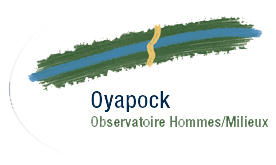

Laureate of the Laboratory for Excellence project (LabEx) in the program « Investment in the future », the DRIIHM LabEx, InterDisciplinary Research Facility on Human-Environment Interactions, aggregate 131 human-environments observatories (OHM in french), tools for observing socio-ecosystems impacted by anthropic events. Created by CNRS-INEE in 2007, they are located in metropolitan France (6: Bassin Minier de Provence (provence Coalfield), Pyrénées-haut Vicdessos, Vallée du Rhône (Rhone valley), Littoral Méditerranéen (French mediterranean coastal zone), Pays de Bitche (Bitche County) and Fessenheim), overseas France (2: Oyapock (French Guyana), Littoral caraïbe (Caribbean Coast)) and abroad (5: Estarreja (Portugal), Téssékéré (Sénégal), Nunavik (Canada), Pima County (USA), Patagonia-Bahia Exploradores (Chile)).
DRIIHM brings together over 1,400 research staff, including 300 foreigners, from 200 research units in 87 french and foreign universities, 46 research organizations and "Grandes Écoles". It has financed 960 research projects, supervised 190 doctorates, 110 post-doctorates and over 400 Master's degrees.
Les lauréats de l'appel à projets de recherche 2016 pour l'OHM Bassin Minier de Provence sont :
Toutes les félicitations du LabEx DRIIHM.
 Les 7 lauréats de l'appel à projets de recherche 2016 pour l'OHM Oyapock sont :
Les 7 lauréats de l'appel à projets de recherche 2016 pour l'OHM Oyapock sont :
Toutes les félicitations du LabEx DRIIHM
The new call for projects Labex DRIIHM-IRDHEI 2016 has been launched.
L’Observatoire Hommes-Milieux Pays de Bitche, en collaboration avec l’association Artopie, dans le cadre du Forum Social Local et Rural qui se tiendra à Meisenthal (57) entre le 23 octobre et le 1er novembre 2015, proposera trois plateaux thématiques (entrée libre et gratuite) :
 See you Monday, October 12, 2015 at the Grand Parc de Miribel Jonage (69) for the day of the OSR.
See you Monday, October 12, 2015 at the Grand Parc de Miribel Jonage (69) for the day of the OSR.
This seminar aims to share the major scientific advances gained since 2013 on (1) MY flows and contaminants, (2) sedimentation processes alluvial margins, and (3) of sediment flux modeling MES on Rhone river system.
For more information or to register, Follow this link !
La gestion des données, de leur ouverture et de leur valorisation est cruciale dans le monde de la recherche. Au sein de notre dispositif interdisciplinaire, les données produites sont diverses et hétérogènes, en matière de domaines et d’activités que de types de traitement et de format, et cela rend plus complexe encore la résolution des questions que cela pose. Les ingénieurs supports ou référents de chacun des 13 OHM composent le groupe de travail transverse DataDRIIHM qui se consacrent à la mise en place, pour la communauté des chercheurs impliqués dans les OHM, d’Outils communs de Gestion Intégrée de l’Information Scientifique (Charte OGIIS, 2012). Ce système intégratif peut reposer sur des outils et/ou technologies divers et variés. Il veille à leur mise à jour, l’interopérabilité des solutions techniques retenues et à la formation des utilisateurs.
Chacun de ces outils est détaillé dans les onglets respectifs.
The LITEAU program calls for scientific papers as part of its next conference to be held on 14 and 15 January 2016 in Brest, in partnership with the National Research Agency, Ifremer and scientific interest group Hommer.
The conference addresses the renewal of the modes of knowledge production, particularly evolutionary and complex relationships between dynamic observation of the sea and coast, and thematic research currently being debated widely within OHM.
Read more: Symposium Observation and research to support coastal and marine policies
Page 10 of 13